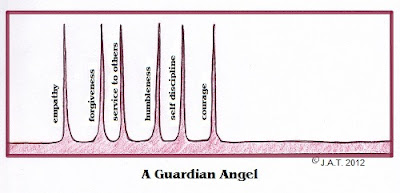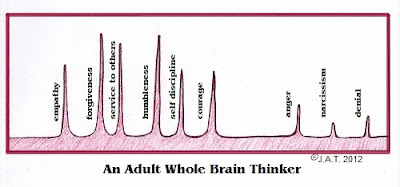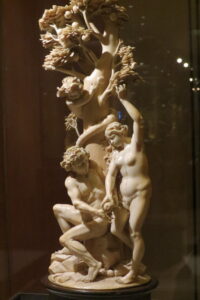This is a research paper I wrote in 2009 for a course on New Testament exegesis. It explains in detail some of the major themes found in the Gospel of Mark.
The paper pasted here is as I wrote it, including the endnotes, where I confess I don’t yet understand how the word “artos” (leavened bread, loaf) is being used by Mark. Since then (with Jesus’ help), I’ve figured it out.

“Now the disciples had forgotten to bring any bread; and they had only one loaf with them in the boat. And he cautioned them, saying, ‘Watch out — beware of the yeast of the Pharisees and the yeast of Herod.’ They said to one another, ‘It is because we have no bread.’ And becoming aware of it, Jesus said to them, ‘Why are you talking about having no bread? Do you still not perceive or understand? Are your hearts hardened? Do you have eyes, and fail to see? Do you have ears, and fail to hear? And do you not remember? When I broke the five loaves for the five thousand, how many baskets full of broken pieces did you collect?’ They said to him, ‘Twelve.’ And the seven for the four thousand, how many baskets full of broken pieces did you collect?’ And they said to him, ‘Seven.’ Then he said to them, ‘Do you not yet understand?’” (Mark 8:14-21). Photo credit JAT 2021.
RADICAL MESSIAH AND THE SHEMA: MARK’S THEMES OF UNDERSTANDING AND STRENGTH
Graham Stanton, in his discussion about the Gospel of Mark, refers to “Mark’s genius as a story-teller” (41), and says, “perhaps Mark should be seen not so much as a block of toffee (form criticism) or as a string of pearls (redaction criticism), but as a piece of rope with interwoven strands” (41). Later in the chapter, he asks these questions: “Why was this gospel written? Many scholars have proposed quite specific historical or theological settings. But they are usually able to make reasonable sense of only one or two of the many interrelated strands which the evangelist develops” (57-58). One strand which I feel has been overlooked is Mark’s overt addition to the Shema (Deut. 6:4-9) in Chapter12:29 of the Gospel. So obvious would this change have been to a Jewish Christian audience in the early to mid-60’s CE that the question of Mark’s purpose must be raised. What was he signalling to his audience with this change? Why did he dare add to a well-known prayer that, according to the Jewish Study Bible, was being formally recited late in the Second Temple period (379)? It is the thesis of this paper that Mark did not accidentally alter the Shema through lack of knowledge, and that he did not accidentally link the Shema to the commandment in Leviticus 19:18 to love one’s neighbour as oneself (12:31). There was a purpose to his addition of the phrase “and with all your mind (διανοίας)” to the existing formulation of “you shall love the LORD your God with all your heart (καρδίας) and with all your soul (ψυχnς) and with all your might (iσχύος).” This supposition is supported by Mark’s repetition of the Shema in 12:32-33, altered yet again, this time without genitive cases, and with a changed emphasis to understanding (συνέσεως). Here the sympathetic – and sensible (νουνεχwς) – scribe is allowed by Mark to voice the two most important commandments: “You are right, Teacher; you have truly said that ‘he is one, and besides him there is no other; and ‘to love him with all the heart, and with all the understanding, with all the strength,’ and ‘to love one’s neighbor as oneself,’ – this is much more important than all whole burnt offerings and sacrifices.” The penny then drops for readers as Jesus says to the scribe, “You are not far from the kingdom of God” (present tense verb, 12:34). Mark has just presented a major clue to unravelling some of the strands of his gospel.
The altered Shema is part of a teaching chreia (12:28-34) that can be seen, it is argued here, as an early creedal statement, the climax and summary of Jesus’ teachings about what it means to be “not far from the kingdom of God” (12:34). It is difficult to understand Jesus’ teachings about the kingdom of God, says Mark in different ways throughout the Gospel. Even Jesus’ closest friends, the disciples, do not understand (4:10-13). The whole thing can be boiled down to two commandments (12:28-31), which sound easy at first, but are much more difficult to practice than the old system of “burnt offerings and sacrifices,” a system which requires Jews to show unswerving loyalty. (Loyalty, not private emotion, is the meaning of the verb aheb, “love,” as it applies to the Shema, according to the Jewish Study Bible (380) and Sakenfeld (376)). A big part of Jesus’ version of faith, according to Mark, is the requirement that disciples use their minds. Fideism is not acceptable. God’s faithful must question the specific ways in which religious teachings are being misused (e.g. 2:23-28; 3:1-6; 7:1-23; 12:38-40; 12:41-44), just as in the past Jews once questioned harmful religious and societal conventions (e.g. Exod. 20:2-6; 21:1 – 22:16; 22:20-12). (Mark thus shows Jesus to be following the “wilderness spirit” of the Sinai Covenant in the Torah (cf. Mark 1:3,4,12), as opposed to the Temple and hierarchy-based Zion Covenant presented in the Psalms and the Deuteronomistic History.[1]) God’s faithful must be willing to not only open their hearts and souls to God’s kingdom, but also their minds (διάνοια) – their innate capacity to think and understand in moral ways (Harder 125). Moral thinking and moral decision-making is a higher form of loving God than being obedient and loyal to the laws of the Zion Covenant.
This kind of “thinking faith,” directed towards loving God (e.g. 1:35-39; 15:25-32), loving others (eg. 9:33-37; 10:41-45), and loving themselves (e.g. 12:31)[2], will put them in opposition to others – family (e.g. 3:21; 3:31-35; 10:28-31), friends (e.g. 6:1-3; 14:66-72), Pharisees (e.g. 3:6, 12:13-17), scribes and chief priests (e.g. 2:6-9, 3:16-17; 11:18), and Gentiles (e.g. 5:14-17; 15:16-20) – who choose to follow honour-oriented traditions. Understanding is not an instantaneous gift from God, however (clearly evidenced in 8:14-21)[3]. Nor is understanding a gift conferred only on the disciples closest to Jesus (e.g. 5:33-34; 9:33-37; 10:17-22; 12:34; 14:6-9). Understanding is a long, difficult process which disciples must willingly participate in (e.g. 4:13; 4:33-34; 10:23-27; 13:9-13). It requires strength, a theme which Mark repeatedly intertwines with the requirement for understanding, as shall be shown. God’s faithful must commit their strength (iσχύς) to a process spread out over time and geography (hence Jesus’ travels back and forth across Galilee and adjacent territories) and also over boundaries of class and honour (hence Jesus’ willingness to heal and teach people from disadvantaged groups). It is a process open to all people, regardless of race, religion, gender, state of mental and/or physical health, wealth, or status. But it is a difficult process.
Mark – for all that he is trying to describe a “thinking faith” – seems very wary of directly invoking Hellenistic or Judeo-Hellenistic notions of philosophy, rational thought, or “wisdom” (σοφία). Σοφία is used 51 times in the New Testament, but only once in Mark (on the lips of the surprised synagogue attendees in 6:2). The adjective σοφός appears 22 times in the New Testament, but not once in Mark. Whatever claim Mark is making, it is not a claim for σοφία (wisdom, insight, intelligence, knowledge, divine knowledge). He prefers the cognates of the more “practical” verbs συνίημι (understand, comprehend, perceive, have insight into) and διαλογίζομαι (discuss, argue, consider, reason, wonder about, question). It is notable that, although he uses the adverb νουνεχwς once, and the verb νοέω a few times, he does not use the Greek word νοuς, a noun meaning perception, understanding, thoughts, or reason. Νοuς is attested since Linear B; it was used by Plato to mean “the highest of the three parts of the soul” (Harder 122), and still later used in the post-canonical, apocryphal era of Jewish literature in a sense associated with the will or deliberation (Harder 125). It is difficult to tell whether Mark avoids using νοuς because in Hebrew there is no direct equivalent for it, and the Septuagint rarely uses it (Harder 124) (compare to Paul, who uses it in Romans and 1 Corinthians); or whether Mark avoids using it because he has a general tendency to not include abstract “wisdom words” such as “peace,” “hope,” and “righteousness” words in his writing[4].
It is interesting to ponder Mark’s non-use of the “wisdom words” frequently attested in books of the Old Testament, as well as in the other Gospels, Acts, and the accepted letters of Paul. Certainly it can be argued that these words are malleable enough to serve any purpose (“Peace in our time!”). Perhaps, by not making abundant use of “wisdom words,” Mark hopes to make his readers think, to apply their minds in new ways to the difficult question of what it means to be close to the kingdom of God. (Mark himself lends this impression in 13:14, where he suddenly interjects with “let the reader understand (νοείτω).”) “Out with the poetry, in with the praxis,” seems to be his approach. He therefore intentionally avoids “telling us” at length what Jesus said, and insists on “showing us” what Jesus did – what Jesus’ actions and choices were, where he went, who he talked to, who he aided, and what he did despite his friends’ lack of courage, faith, and love. Mark’s Radical Messiah is a man of relatively few words who teaches by example, and is not interested in raising his own status. (Even the scribe in 12:28-34 is accorded great dignity by Jesus – and also by Mark.) Therefore, for Mark, the examples are what matter most. (By contrast, Matthew’s Jesus seems very fond of the sound of his own voice, and John’s Jesus has a case of the “I ams.”)
It is clear from a review of word usage articles that, by the first century CE, there was a blurring between Jewish and Hellenistic concepts of heart, mind, and soul, and this may explain why Mark felt he needed to add to the traditional phrasing of the Shema. In the Septuagint translation of the Shema, for instance, leb is rendered as καρδία; yet Holloday’s Hebrew and Aramaic Lexicon shows 11 different meanings for leb: the physical heart organ; the seat of vitality; the seat of one’s feelings and impulses; mind, character, disposition, inclination, loyalty, concern; determination, courage, high morale; intention, purpose; mind, attention, consideration, understanding; the self; conscience; metaphorically the “interior” or “middle”; and finally the organizing power of living beings (nefesh – the word which is translated as ψυχή in the Septuagint’s version of the Shema ) (171-172). Harder points out that Septuagint translators rendered the Hebrew leb or lebab as νοuς only six times, as διάνοια 38 times, and as καρδία in most other instances (124). Sorg reports that the Septuagint occasionally translates leb as ψυχή (181). Meanwhile, ψυχή itself (used 101 times in the New Testament) encompasses a broad range of meanings: the whole person or creature; a person’s actual, physical life; the seat of the emotions; the inner life or personality of a person; the part of the person that lives on after death (Harder 682-686; Carrigan). Καρδία can be used literally to mean the physical heart, or it can be used metaphorically. In the New Testament, it is used in 148 passages with a variety of meanings: the seat of intellectual and spiritual life; the inner person or personality/ego; the seat of doubt and hardness; the mind or reason; will, desire, intention (Sorg 182-183). To state, as Cameron does, that “since Hebrew psychology lacked precise terminology, there is some overlapping in the use of nepesh, leb/lebab, and ruah” is something of an understatement. Perhaps Mark, aware of the confusion amongst Jews and Jewish Christians about the meanings of leb and καρδία, nefesh and ψυχή, decides to make certain that no one can dispute the necessity of “mind” and “understanding” (as distinct from Hellenistic wisdom!) by his explicitly including both διανοίας and συνέσεως in the crucial teaching chreia of 12:28-34.
Mark wants to talk about the Radical Messiah’s “thinking faith,” but at the same time he demonstrates a prudent fear of both Jewish and Roman authorities. He does not wish to be arrested for apostasy or political treason (he is writing during a time of heightened political-religious conflict, both within Judaism itself, and between Judaism and the Roman Empire). Therefore, while he shies away from “wisdom words,” he makes ample use of allegory. It is difficult, for instance, to see Mark’s repeated use of boat crossings on the “Sea” of Galilee as anything but a metaphor. It is a lake, after all, and not a very big one, at that – a fact that early Jewish Christian readers in the region would have known. Pheme Perkins points out that the Q Source has no sayings about fishing or grapes, and no stories about storms on the Sea of Galilee (94-95). Mark, however, introduces the Sea of Galilee, fishermen, and boats in his first chapter (1:16, 1:16-20, and 1:19-20 respectively). He is hinting at something. What does a boat do? we then must ask. A boat helps us cross the waters. What have bodies of water traditionally represented in Jewish thought? The forces of chaos that are overcome by the sovereign powers of God (Gen. 1:2 – 2:3). And how does one overcome the forces of chaos? In part, by using one’s strength – at which point it is very hard to overlook the similarity in sound between the word for “fish” (iχθύς) and the word for “strength” (iσχύς). (We know that Paul uses plays on words, so it is not unreasonable to conclude that Mark does the same.) Once this is observed, the two miraculous feedings of the crowd with bread and fish (6:34-44 and 8:1-9) become emblematic of the “strength” with which Jesus feeds the people [5,6] – the same strength that is spoken of in a positive light twice in 12:28-34, in a negative light in 14:37, in a perplexing light in 3:27 and 5:4, and in a contextual way in 15:46, where Joseph of Arimathea has the strength to roll a “very large rock” across the tomb by himself.
In the important verses of 8:14-21, Mark draws an overt link between the allegorical feedings – with their relationship to the theme of strength – and the issue of understanding. Here, while Jesus and the disciples are sitting yet again in their boat (8:14 – the final reference to boats in the Gospel of Mark), Jesus castigates the disciples harshly, in several different ways, because they do not yet understand (νοεiτε) or realize (συνίετε). This pericope is filled with Greek verbs related to the thinking faculties of people (thinking faculties which include input from the senses): the disciples “forgot” the bread (8:14); Jesus cautions them to “see” the yeast of the Pharisees and of Herod (8:15); the disciples “reasoned” among themselves (8:16); Jesus “knows” their attempt at reasoning and asks them why they are still “reasoning” that way instead of “understanding” and “realizing” (8:17); have their “hearts” been hardened? Jesus asks (8:17); do they have “eyes” that don’t see, and “ears” that don’t hear? (8:18); do they not “remember”? (8:18); do they not yet understand? (8:21). Verses 14-21 of Chapter 8 can be seen to conclude and epitomize the first half of Mark’s Gospel, as some scholars have suggested (Perkins 131); however, reading the Gospel in this way does, as Perkins points out, present “as much of a challenge to the audience as the ending of the Gospel does” (131) because of its critical depiction of the disciples. The disciples, both male and female, lack understanding and strength. They have not applied “all their mind” and “all their strength” to loving God or their teacher, Jesus, and therefore – unlike the scribe of 12:28-34 and perhaps unlike Joseph of Arimathea – they have not been able to draw near to the kingdom of God. It is not enough to be loyal, according to Mark. It is not enough to be close to the Rabbi. The disciples will not be able to understand what the kingdom of God is like until they give themselves heart, soul, mind, and strength to the praxis of loving God and loving other people, the sort of praxis which Jesus models on every page of this complex gospel.
ENDNOTES
1. The two covenant thesis in the Jewish Bible is convincingly argued by W.M.
2. Not all scholars agree that 12:29 commands people to love themselves (Klassen 389).
3. Mark does not tell us how Jesus acquired his understanding. We know only that God has adopted Jesus as his son (1:11 and 9:7), and is well pleased with him.
4. In marked contrast to other New Testament authors such as Matthew, Luke in Luke/Acts, and Paul, Mark uses the words “peace” (only 3 times), “hope” (zero times), “love” (X 4), “joy” (X 1), “freedom” (X 0), “glory” (X 3), “just/righteous” (X 3) or “holy” (X 7). (Nelson’s Concordance)
5. I have not yet figured out how “artos” is being used in these passages.
6. In this context, the numerological references in the two miraculous feedings (e.g. 5,000 people, 12 baskets of leftovers, 7 loaves) can be read as being indicators to treat these passages allegorically (unlike the healing miracles, which Mark treats in a factual way).
WORKS CONSULTED
Berlin, Adele and Marc Zvi Brettler, Eds. The Jewish Study Bible: Jewish Publication Society TANAKH Translation. Oxford: Oxford UP, 2004.
Cameron, W.J. “Soul.” New Bible Dictionary. 2nd Ed. Ed. J.D. Douglas. Leicester and Wheaton IL: Inter-varsity and Tyndale House, 1982. 1135.
Carrigan, Henry L. “Soul.” Eerdmans Dictionary of the Bible. Ed. David Noel Freedman. Grand Rapids, MI: Eerdmans, 2000. 1245.
Coogan. Michael D., Ed. The New Oxford Annotated Bible: New Revised Standard Version with the Apocrypha, College Edition. 3rd Ed. Oxford: Oxford UP, 2001.
Ellison, John W., Ed. Nelson’s Complete Concordance of the Revised Standard Version Bible. New York: Nelson & Sons, 1957.
Harder, Georg. “νοuς.” The New International Dictionary of New Testament Theology. Vol. 3. Rev. Ed. Ed. Colin Brown. Grand Rapids, MI: Zondervan, 1986. 122-130.
Harder, Georg. “ψυχή.” The New International Dictionary of New Testament Theology. Vol. 3. Rev. Ed. Ed. Colin Brown. Grand Rapids, MI: Zondervan, 1986. 676-689.
Goetzmann, Jurgen. “σύνεσις.” The New International Dictionary of New Testament Theology. Vol. 3. Rev. Ed. Ed. Colin Brown. Grand Rapids, MI: Zondervan, 1986. 130-134.
Holloday, William L., Ed. A Concise Hebrew and Aramaic Lexicon of the Old Testament. Grand Rapids, MI: Eerdmans, 1988.
Klassen, William. “Love in the New Testament and Early Jewish Literature.” The Anchor Bible Dictionary. Vol. 4. Ed. David Noel Freedman. New York: Doubleday, 1992. 381-396.
Morrison, Clinton. An Analytical Concordance to the Revised Standard Version of the New Testament. Philadelphia: Westminster Press, 1979.
Perkins, Pheme. Introduction to the Synoptic Gospels. Grand Rapids, MI: Eerdmans, 2007.
Sakenfeld, Katharine Door Sakenfeld. “Love in the Old Testament.” The Anchor Bible Dictionary. Vol. 4. Ed. David Noel Freedman. New York: Doubleday, 1992. 375-381.
Schattenmann, Hans-Georg. “Iσχύς.” The New International Dictionary of New Testament Theology. Vol. 3. Rev. Ed. Ed. Colin Brown. Grand Rapids, MI: Zondervan, 1986. 712-716.
Sorg, Theo. “καρδία.” The New International Dictionary of New Testament Theology. Vol. 2. Ed. Colin Brown. Grand Rapids, MI: Zondervan, 1986. 180-184.
Stanton, Graham N. The Gospels and Jesus. Oxford: Oxford UP, 1989.
Posted in
Bible,
courage,
Divine Love,
faith,
Gospel of Mark,
historical Jesus,
insight,
Jesus Redux,
Jesus' original writings,
Kingdom teachings,
Mark vs Paul,
miracles,
parables,
Soul and tagged
Kingdom teachings,
Mark vs Paul |
































